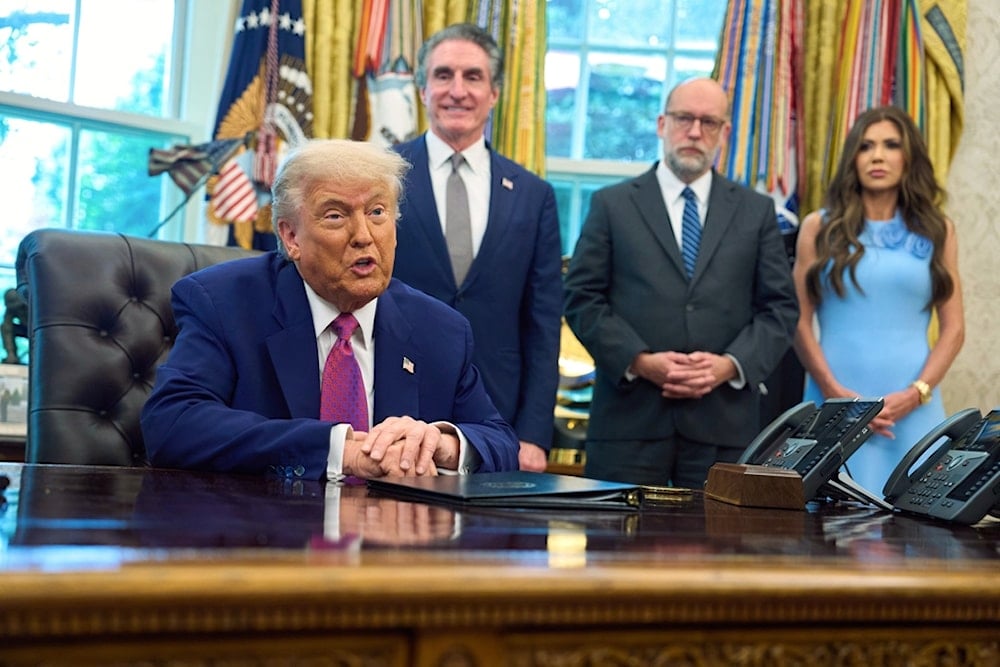Trump claims Iran acting ‘much nore aggressive’ in nuclear talks
Trump calls Iran’s tone in nuclear talks “aggressive” ahead of June 15 Muscat meeting as Tehran refuses to back down over sovereign right to enrich uranium.
-

President Donald Trump speaks with reporters in the Oval Office of the White House, Tuesday, June 10, 2025, in Washington. (AP)
US President Donald Trump said on Tuesday that Iran’s recent posture in nuclear negotiations has grown “much more aggressive,” calling the shift both “surprising” and “disappointing,” just days before the sixth round of indirect talks is set to take place in Muscat, Oman.
“Iran is acting much differently in negotiations than it did just days ago,” Trump told Fox News. “Much more aggressive. It’s surprising to me. It’s disappointing, but we are set to meet again tomorrow – we’ll see.”
The president’s comments came one day after he previewed the upcoming meeting, reaffirming his commitment to avoiding what he called “destruction and death” if talks fail. Trump described the dialogue with Tehran as “very tough at times” and reiterated that Iran’s pursuit of uranium enrichment remains “unacceptable” to Washington.
Iran warns of retaliation over possible IAEA resolution
Iranian Foreign Minister Abbas Araqchi warned Tuesday that Tehran will respond if the International Atomic Energy Agency (IAEA) adopts an anti-Iran resolution.
In a call with Japanese Foreign Minister Takeshi Iwaya, Araqchi condemned what he called "provocative" efforts by the US, France, Germany, and the U.K. to push the measure, warning that Iran would hold them responsible for the consequences.
The Iranian Foreign Ministry stated that any “unwise and destructive” move by the IAEA Board of Governors would be met with a “corresponding response.” Japan, meanwhile, reaffirmed support for Iran’s right to peaceful nuclear energy and encouraged continued US-Iran dialogue.
Tehran confirms sixth round of talks scheduled for June 15
Earlier on Tuesday, Iranian Foreign Ministry spokesman Esmaeil Baqaei confirmed that the sixth round of indirect negotiations between Iran and the United States will take place on June 15 in the Omani capital of Muscat.
The ongoing talks, which began on April 12, have been facilitated by Oman after the US president proposed a new agreement on Iran’s nuclear program while simultaneously threatening military action if diplomacy failed. Iran rejected the prospect of direct negotiations but agreed to the indirect format.
The fifth round of talks was held on May 23, amid mounting tensions. The dispute escalated as Washington demanded Iran halt all uranium enrichment activities, which Tehran has repeatedly rejected. Iranian officials have repeatedly stated that no deal would be reached as long as the US insists on a complete suspension of enrichment.
Iran ups its condemnation of the West exploiting the IAEA
Earlier on Monday, Iran stepped up its condemnation of the US, France, Britain, and Germany, alleging that they are exploiting the International Atomic Energy Agency (IAEA) for political purposes to pressure Tehran. The sharp criticism coincides with these nations preparing to present an anti-Iran resolution during this week’s IAEA Board of Governors meeting in Vienna.
Baghaei emphasized that the Islamic Republic has fully complied with its obligations under the Non-Proliferation Treaty (NPT) and the Comprehensive Safeguards Agreement, while accusing Western nations of distorting the role of the International Atomic Energy Agency (IAEA) to advance their own geopolitical agendas.
On another note, the Director-General of the IAEA, Rafael Grossi, has stated that while the agency has found “some issues” during its inspections, there is no conclusive evidence to indicate the existence of an “unnatural nuclear program” in Iran.
Sensitive documents to expose backers of Israeli nuclear program
The spokesperson also addressed concerns surrounding Iran’s peaceful nuclear program, pointing to documents Tehran has promised to unveil regarding the Israeli nuclear program.
On June 7, Iran announced that it had obtained a treasure trove of intelligence against "Israel", which reportedly includes sensitive information on "Israel's" nuclear activity, critical infrastructure, and schemes for the region.
These documents, Baqaei said, would prove that those questioning Iran’s intentions are actively supporting "Israel's" military nuclear program.
He highlighted that the documents would demonstrate that parties critical of Iran’s nuclear activity are, in fact, enabling the military capabilities of "Israel", which remains outside international nuclear oversight.

 4 Min Read
4 Min Read










